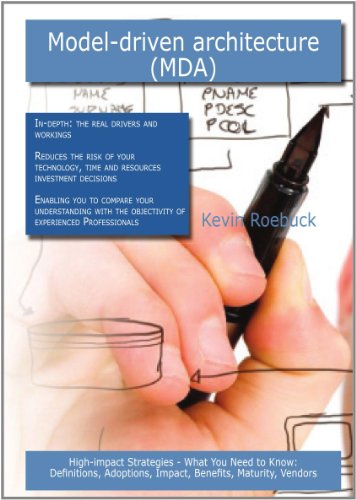Safeware: System Safety and Computers (Paperback)
暫譯: 安全軟體:系統安全與計算機
Nancy G. Leveson
- 出版商: Addison Wesley
- 出版日期: 1995-04-17
- 售價: $2,110
- 貴賓價: 9.5 折 $2,005
- 語言: 英文
- 頁數: 704
- 裝訂: Paperback
- ISBN: 0201119722
- ISBN-13: 9780201119725
海外代購書籍(需單獨結帳)
買這商品的人也買了...
-
 Windows CE.NET 程式設計 (Programming Microsoft Windows CE .Net, 3/e)
Windows CE.NET 程式設計 (Programming Microsoft Windows CE .Net, 3/e)$890$703 -
 Flash ActionScript 3.0 動畫製作大師 (Foundation Actionscript 3.0 Animation: Making Things Move!)
Flash ActionScript 3.0 動畫製作大師 (Foundation Actionscript 3.0 Animation: Making Things Move!)$650$553 -
 Microsoft Office SharePoint Server 2007 新一代企業表單與內容管理 (第二集)
Microsoft Office SharePoint Server 2007 新一代企業表單與內容管理 (第二集)$720$569 -
 現代嵌入式系統開發專案實務-菜鳥成長日誌與專案經理的私房菜
現代嵌入式系統開發專案實務-菜鳥成長日誌與專案經理的私房菜$600$480 -
 Visual Basic 函數參考大全
Visual Basic 函數參考大全$650$514 -
 簡單學會 Flash ActionScript 3.0
簡單學會 Flash ActionScript 3.0$400$340 -
 AutoCAD 2008 實力養成暨評量, 2/e
AutoCAD 2008 實力養成暨評量, 2/e$390$308 -
 Google 超級攻略
Google 超級攻略$380$300 -
 大話設計模式
大話設計模式$620$490 -
 Visual Basic 2008 程式設計經典
Visual Basic 2008 程式設計經典$650$514 -
 Linux Device Driver Programming 驅動程式設計
Linux Device Driver Programming 驅動程式設計$690$587 -
 Silverlight 2.0 精華技術手冊─使用VC#+WPF程式設計(套書)
Silverlight 2.0 精華技術手冊─使用VC#+WPF程式設計(套書)$650$514 -
 ASP.NET 專題實務-使用 C#
ASP.NET 專題實務-使用 C#$650$514 -
 jQuery 實戰手冊 (jQuery in Action)
jQuery 實戰手冊 (jQuery in Action)$480$379 -
 這樣取景曝光才漂亮
這樣取景曝光才漂亮$420$328 -
 Google!Android 手機應用程式設計入門
Google!Android 手機應用程式設計入門$520$411 -
 ActionScript 3.0 活用範例大辭典
ActionScript 3.0 活用範例大辭典$550$429 -
 網頁設計驚嘆號-Dreamweaver 至高的網頁特效 188 招
網頁設計驚嘆號-Dreamweaver 至高的網頁特效 188 招$650$514 -
 Google Android SDK 開發範例大全
Google Android SDK 開發範例大全$750$593 -
 Google Android 程式設計與應用
Google Android 程式設計與應用$520$442 -
 ZBrush 角色建模專業技法
ZBrush 角色建模專業技法$560$442 -
 正確學會 Flash CS4 的 16 堂課
正確學會 Flash CS4 的 16 堂課$520$442 -
 Adobe Photoshop 解構
Adobe Photoshop 解構$780$663 -
 Download! 網路密技王 No.10
Download! 網路密技王 No.10$199$157 -
 專案管理知識體指南, 4/e (A Guide to the Project Management Body of Knowledge: (PMBOK Guide), 4/e)
專案管理知識體指南, 4/e (A Guide to the Project Management Body of Knowledge: (PMBOK Guide), 4/e)$1,350$1,283
相關主題
商品描述
Description
We are building systems today-and using computers to control them-that have the potential for large-scale destruction of life and environment. More than ever, software engineers and system developers, as well as their managers, must understand the issues and develop the skills needed to anticipate and prevent accidents. Nancy Leveson examines what is currently known about building safe electromechanical systems and looks at past accidents to see what practical lessons can be applied to new computer-controlled systems. ![]()
Table Of Contents
I The Nature Of Risk.
Is Increased Concern Justified?.
Unique Risk Factors in Industrialized Society.
Computers And Risk.
Software Myths.
Why Software Engineering is hard.
The Reality We Face.
Causes Of Accidents.
Flaws in the Safety Culture.
Ineffective Organizational Structure.
Ineffective Technical Activities.
Human Error And Risk.
The Need for Humans in Automated Systems.
Human Error as Human-Task Mismatch.
Conclusions.
The Role Of Humans In Automated Systems.
The Human as Monitor.
The Human as Backup.
The Human as Partner.
Conclusions.
II Introduction To System Safety.
Systems Theory.
Systems Engineering.
Systems Analysis.
Fundamentals Of System Safety.
Basic Concepts.
Software System Safety.
Cost and Effectiveness of System Safety.
Other Approaches To Safety.
Reliability Engineering.
Application-Specific Approaches to Safety.
III Definitions And Models.
Accident and Incident.
Hazard.
Risk.
Safety.
Safety and Security.
Accident And Human Error Models.
Human Task and Error Models.
Summary.
IV Elements Of A Safeware Program.
Place in the Organizational Structure.
Documentation.
The System And Software Safety Process.
Conceptual Development.
Design.
Full-Scale Development.
Production and Deployment.
Operation.
>Examples.
Hazard Analysis.
Types of System Models.
General Types of Analysis.
Limitations and Criticisms of Hazard Analysis.
Hazard Analysis Models And Techniques.
Hazard Indices.
Fault Tree Analysis.
Management Oversight and Risk Tree (MORT) Analysis.
Event Tree Analysis.
Cause-Consequence analysis (CCA).
Hazards and Operability Analysis (HAZOP).
Interface Analyses.
Failure Modes and Effects Analysis (FMEA).
Failure Modes, Effects, and Criticality Analysis (FMECA).
Fault Hazard Analysis (FHA).
State Machine Hazard Analysis (SMHA).
Task and Human Error Analysis Techniques.
Evaluations of Hazard Analysis Techniques.
Software Hazard And Requirements Analysis.
Requirements Specification Components.
Completeness in Requirements Specifications.
Completeness Criteria for Requirements Analysis.
Constraint Analysis.
Designing For Safety.
Design Techniques.
Design Modification and Maintenance.
Design Of The Human-Machine Interface.
Matching Tasks to Human Characteristics.
Reducing Safety-Critical Human Errors.
Providing Appropriate Information and Feedback.
Training and Maintaining Skills.
Guidelines for Safe HMI Design.
Verification Of Safety.
Static Analysis.
Independent Verification and Validation.
Summary.
商品描述(中文翻譯)
描述
我們今天正在建造系統——並使用電腦來控制它們——這些系統具有大規模破壞生命和環境的潛力。比以往任何時候,軟體工程師和系統開發人員,以及他們的管理者,必須理解這些問題並發展出預測和防止事故所需的技能。南希·勒維森(Nancy Leveson)檢視了目前關於建造安全的機電系統的知識,並回顧過去的事故,以了解哪些實用的教訓可以應用於新的電腦控制系統。
目錄
I 風險的本質
風險在現代社會中的角色
對風險的態度變化
增加的關注是否合理?
工業化社會中的獨特風險因素
電腦與風險
電腦在事故中的角色
軟體神話
為什麼軟體工程如此困難
我們面臨的現實
事故的原因
因果關係的概念
安全文化中的缺陷
無效的組織結構
無效的技術活動
人為錯誤與風險
人類是否造成大多數事故?
自動化系統中對人類的需求
人為錯誤作為人類與任務不匹配
結論
自動化系統中人類的角色
心理模型
人類作為監控者
人類作為備份
人類作為夥伴
結論
II 系統安全導論
系統安全的基礎
二戰前的安全工程
系統理論
系統工程
系統分析
系統安全的基本原則
歷史發展
基本概念
軟體系統安全
系統安全的成本與效益
其他安全方法
工業安全
可靠性工程
特定應用的安全方法
III 定義與模型
術語
故障與錯誤
事故與事件
危害
風險
安全
安全與保安
事故與人為錯誤模型
事故模型
人類任務與錯誤模型
總結
IV 安全軟體計畫的要素
管理安全
一般管理的角色
在組織結構中的位置
文件化
系統與軟體安全過程
一般任務
概念開發
設計
全面開發
生產與部署
運行
範例
危害分析
危害分析過程
系統模型的類型
一般分析類型
危害分析的限制與批評
危害分析模型與技術
檢查清單
危害指數
故障樹分析
管理監督與風險樹(MORT)分析
事件樹分析
因果關係分析(CCA)
危害與可操作性分析(HAZOP)
介面分析
故障模式與影響分析(FMEA)
故障模式、影響與關鍵性分析(FMECA)
故障危害分析(FHA)
狀態機危害分析(SMHA)
任務與人為錯誤分析技術
危害分析技術的評估
軟體危害與需求分析
過程考量
需求規範組件
需求規範的完整性
需求分析的完整性標準
約束分析
設計安全
設計過程
設計技術
設計修改與維護
人機介面的設計
一般過程考量
將任務與人類特徵匹配
減少安全關鍵的人為錯誤
提供適當的信息與反饋
培訓與維持技能
安全HMI設計的指導方針
安全的驗證
動態分析
靜態分析
獨立驗證與確認
總結











